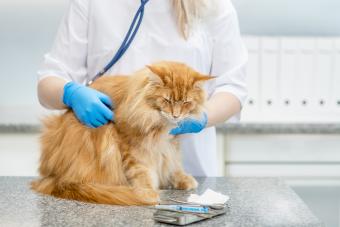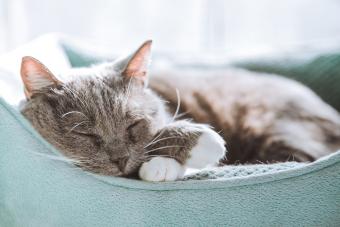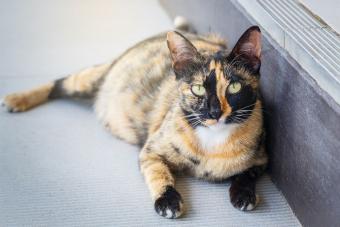
If your elderly cat spends most of their day snoozing on the couch, you may wonder if they should continue receiving vaccinations. The short answer is maybe, but the decision depends on several factors. Before you cancel their next vaccine appointment, it's important to understand the scenarios when vaccinating is essential, and when your older cat is no longer a good candidate for vaccinations. A board-certified veterinary feline specialist offers insight to help owners approach this matter.
At What Age Is a Cat Considered "Older?"
According to the American Association of Feline Practitioners (AAFP), a cat is considered a senior when they reach 10 years of age, and a cat becomes geriatric after age 15. These are the life stages when age-related changes commonly occur. Because issues can progress more rapidly in these aging patients, it's important for senior and geriatric cats to visit their vet regularly, even if they are not receiving vaccines.

Considerations When Vaccinating Older Cats
Experts believe that age is not the sole factor to consider when determining if an older cat should receive vaccines. "Whether or not to vaccinate depends on many things when assessing the benefits and risks of vaccines," said Dr. Glenn Olah, DVM, Ph.D., DABVP (Feline).
Vaccine History
With each vaccine, your cat's immune system becomes stimulated, promoting the creation of antibodies (cells that fight invaders like bacteria).
The Strength of their Immune System
It's important to remember that although a cat "may have adequate protection after a lifetime of vaccination for core viral infections," Dr. Olah said, "they also may have a less robust immune system due to advanced age. If a senior cat contracts a virus, they may become sicker than a younger cat might, since their immune system may not be as strong as it once was.
Titers Can Be Helpful
Antibody titers can give insight into whether your cat has protective immunity, but the results may not be reliable for all viruses. The AAFP Feline Vaccination Advisory Panel recommends "employing defined revaccination intervals rather than measuring antibody titers to assure protection."
Although titers should not be used in place of vaccines, they can be a helpful tool for those cats who cannot tolerate vaccinations.
Consider Their Risk Level
Consider your cats' level of exposure to infectious agents. A cat that you may describe as "indoor-only," yet who shares space with an indoor-outdoor housemate, is still exposed to outside pathogens even though they themselves aren't outside regularly.
Disease From New Pets
An indoor senior cat who interacts with foster cats from the shelter or a new kitten housemate is also at risk of disease transmission. The AAFP states that one must assess "the cat's lifestyle as well as the lifestyle of any other cats in the same household."
If Your Cat is Strictly Indoor
Older cats strictly kept indoors are not exempt from vaccines, but they may not need as many.
Give the Core Vaccines
There are two core feline vaccines that are considered essential for all cats: the FVRCP combination and rabies vaccines. These are classified as "core" based on the severity and prevalence of the diseases they protect against.
Contaminated Items Can Still Make Their Way In
Even if your older cat never leaves your house, contagions can still make their way in. For example, potentially fatal viruses such as feline panleukopenia and calicivirus (both covered by the core FVRCP vaccine) can be brought into the home by visiting cats or contaminated items.
Cats with feline herpes virus or a history of recurrent upper respiratory viral infections may be particularly sensitive.
Rabies is Still a Threat
Wildlife carrying rabies can make their way into your household. Although rare, these cases have been documented. It is also legally required.
Core or More? Which Vaccinations Should Older Cats Get?
Does your older cat or any feline housemate roam outdoors? If they do, then they are at higher risk of exposure and would likely benefit from both core and non-core, also referred to as lifestyle vaccines. Your veterinarian may recommend these for cats who use a catio, as they may have some exposure to outdoor pathogens (though fewer).
Vaccines for Viruses
Many cat-specific viruses, such as Feline Leukemia Virus (FeLV) and Feline Immunodeficiency Virus (FIV) can be easily spread through saliva, blood, and other bodily fluids. Vaccines are available for both.
Medical History
If your cat has a chronic illness or has been diagnosed with a new disease since their last shot, ask your vet for guidance regarding future vaccines. Dr. Olah mentions that with geriatric patients in particular, "There may be co-morbidity conditions (the presence of two or more diseases in a patient) that may preclude further vaccinations."
If Your Cat Has a Suppressed Immune System
In those patients who are immunosuppressed, either due to disease (for example, FIV or FeLV) or as a result of medications such as steroids, a veterinarian may recommend avoiding modified live vaccines.
Dr. Olah reminds owners that "actual infection may be considerably worse for this cohort than risks or side-effects from vaccination."
Vaccines for Cats Who Experience Adverse Reactions
If a cat has experienced adverse reactions to vaccines in the past, such as persistent vomiting or diarrhea, hives, facial swelling, severe lethargy, or difficulty breathing following vaccination administration, they may not be a good candidate for future boosters.
Ask About Pre-Vaccine Antihistamines
Some patients who experience mild reactions do well with a pre-vaccine dose of injectable anti-histamine and close monitoring, but your vet can make specific recommendations based on the severity of your pet's reaction.
Local Vaccine Laws
Depending on where you live, you may be obligated by law to vaccinate your cat, regardless of their age. This typically only applies to the rabies vaccine, as the disease is zoonotic, deadly, and can be transmitted from pets to humans. Yes, many of these guidelines apply to indoor-only cats as well.
In the United States, laws vary based on your state or even county of residence. Be sure to check with your local legislature to determine your legal obligation, or ask your vet.
Veterinarian Recommendation
Every cat is an individual; therefore, Dr. Olah confirms that the "decision to vaccinate an older cat is definitely based on a case-by-case basis."
Discuss Vaccines With Your Family Vet
Your personal veterinarian is the best person to talk to regarding the benefits versus potential risks of vaccines for your unique, older cat. They know your pet's medical history and can assess their current condition.
Bring up any concerns you may have with your vet, and together, you can determine the best course of action for your cat.

Ask About Intranasal Options
Indoor cats may benefit from "an intranasal form [of the FVRCP vaccine] in order to enhance IgA protection more so than IgG protection," notes Dr. Olah. IgA is super important for the body's first line of defense, protecting areas like the mouth and nose from germs.
Because the Feline Calicivirus (FCV) mainly spreads through saliva and targets the upper part of the respiratory system, boosting IgA protection helps strengthen the body's initial defense against the virus right where it tries to get in.
This can help stop the virus from causing an infection or at least make the illness less severe.
Advancements in Feline Vaccine Safety
Some cat owners are reluctant to vaccinate their cats due to reports of tumors arising at vaccination sites. If this has been weighing on your mind, your concerns are completely understandable.
Injection Site Reactions and Why Placement Matters
According to the AVMA, "Although rare, feline injection-site sarcomas (FISS) are cancerous tumors that can arise following injections." They continue to explain, "While a specific cause has not been established, it is thought that inflammatory processes related to administration of injectable products can lead to formation of sarcomas."
Fortunately, A Task Force Was Developed in the '90s
A Vaccine-Associated Feline Sarcoma Task Force was even formed in the 1990s specifically to address these concerns. You can rest assured knowing that improvements in cat vaccine protocols have been made to reduce these occurrences, including changes to where and how the vaccines are administered.
Additives in Vaccines May Have Been the Problem
Many experts believe that additives in vaccines, known as adjuvants, contributed to the prevalence of feline injection-site sarcomas. Therefore, non-adjuvanted formulations were developed in the year 2000 and are widely used in veterinary hospitals today.
What is an adjuvant? The AVMA describes it as "a substance added to the vaccine to increase the effectiveness of the component antigens - such as killed microorganisms - in induction of an immune response." In other words, In other words, it's something that is added to make the vaccine work better that may help give the immune system a boost.
Many Vets Choose to Use Non-Adjuvanted Vaccines to Lower Tumor Risk
Although this is somewhat of a controversial topic within the veterinary community, many feline vets elect to use only non-adjuvanted vaccines. In addition, vaccine-site location recommendations are in place to give cats a better prognosis if they do develop a tumor at the location.
Weigh the Benefits And Risks
Understandably, you want to keep your elderly cat as healthy as possible. If your cat has no existing conditions and is at risk for viruses due to their history or lifestyle, they may benefit from continued vaccines.
Dr. Olah emphasizes, "Regardless of age, a benefit-risk assessment on a case-by-case basis should be made for all feline patients." Be sure to discuss with your vet whether your senior cat needs vaccinations. Together, you can weigh the benefits and potential risks involved and make the best choice for your feline friend.







